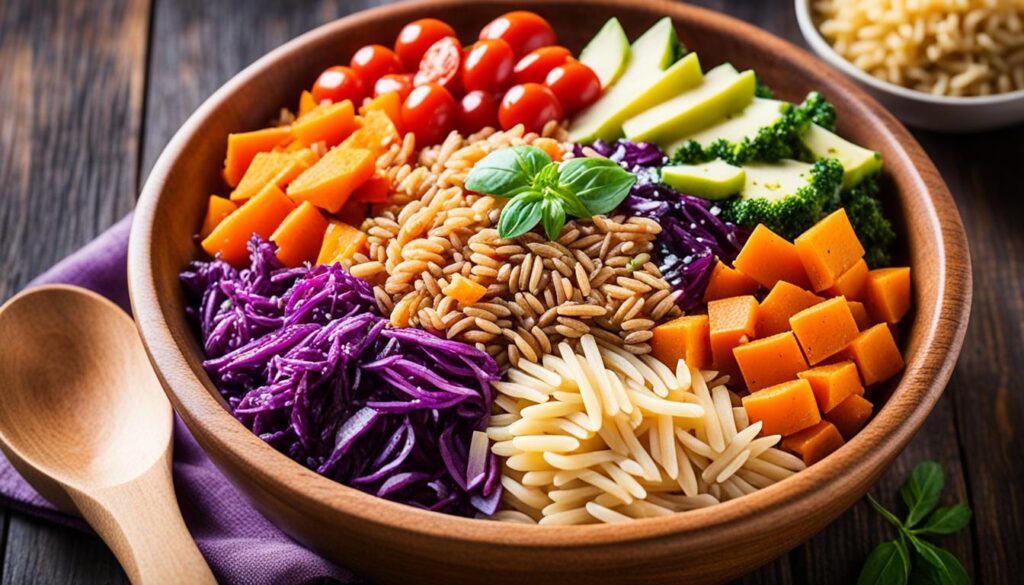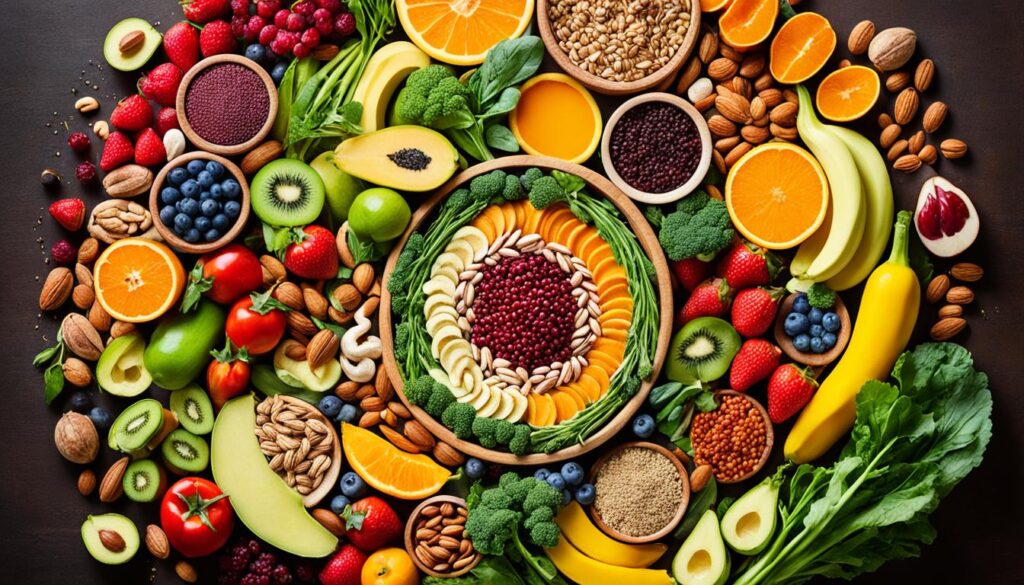Eating healthy and staying balanced is key for your health and happiness. It means picking foods that are good for you. Also, it’s important to eat the correct calories for how active you are.
A great diet has many different foods. This ensures you get all the nutrients you need. By choosing wisely, you give your body everything it needs to keep going strong.
Key Takeaways:
- Eating a balanced diet is important for overall health and wellbeing.
- Making nutritious choices is crucial for providing your body with the necessary nutrients.
- Consuming the right amount of calories for your activity level is essential.
- Incorporating a variety of foods in your diet ensures that you get all the necessary nutrients.
- By adopting healthy eating habits, you can maintain long-term health and wellbeing.
The Importance of Calorie Balance
Maintaining a healthy weight is key for good health. It’s all about balancing the energy you use with what you take in through food. This is known as calorie balance.
Understanding Calorie Balance
Calories are a measure of energy in our food and drinks. Eating more calories than you use can store extra energy as fat. This leads to gaining weight. But, if you eat fewer calories than your body uses, it’ll pull from its fat stores. This helps in losing weight.
Energy Consumption and Weight Management
To stay at a good weight, you need to balance what you eat with what you burn off. The number of calories required daily varies for each person. It depends on things like age, sex, weight, height, and how active you are. As a benchmark, men need about 2,500 calories a day, and women about 2,000 calories daily.
Yet, these are just averages. If you have special health goals or conditions, your numbers might be different. Always check with a healthcare expert or dietitian for advice tailored to you.
The Role of Calorie Balance in Weight Management
Calorie balance is vital for managing your weight. Eating fewer calories than you burn creates a deficit. This makes your body use up fat stores for fuel. Doing this over time can lead to losing weight. Conversely, eating more than you burn leads to extra calories becoming fat on your body.
Strategies for Achieving Calorie Balance
Focus on making smart food choices to keep your calories in check. Here are some tips:
- Choose nutrient-rich foods: Go for foods like fresh fruits, veggies, whole grains, lean meats, and legumes for their vitamins, minerals, and fiber.
- Eat with awareness: Listen to your body’s signals for hunger and fullness. Avoid eating to cope with emotions or due to outside pressures.
- Watch your portions: Be careful with how much you eat. Using smaller plates can help control portion sizes.
- Stay active: Regular workouts can boost the calories you burn. Aim for a mix of heart-pumping activities and muscle-building exercises.
Striving for a healthy calorie balance is a process that needs time, effort, and self-love. With the right food and exercise, you can reach your weight goals. This also improves your overall health.
Base Your Meals on Higher Fiber Starchy Carbohydrates
Including high fiber starchy carbohydrates in your meals is key for a balanced diet. Think of foods like potatoes, bread, rice, pasta, and breakfast cereals. One-third of what you eat should be these carbs.
Eating wholegrain or higher fiber versions of these carbs is very good for you. They have more fiber. Fiber helps with your gut health and makes you feel full longer. This helps with keeping a healthy weight by preventing overeating or snacking too much.
Wholegrain carbs give you steady energy all day. This avoids sudden drops in energy and keeps you feeling good.
But, watch out for the fats you add to these foods. Use healthy fats like those in avocados or olive oil. They boost the meal’s nutrition without adding too many extra calories.

Making meals with high fiber starchy carbs ensures you eat a balanced, healthy diet. They are packed with nutrients, energy, and fiber. This supports your overall health and helps you feel strong and full of life.
Eat Lots of Fruits and Vegetables
Eating many kinds of fruits and vegetables is key to staying healthy. They give us important nutrients like vitamins, minerals, and antioxidants. These boost our health and make us feel good.
You should have at least five servings of fruits and veggies daily. They can be fresh, frozen, canned, dried, or juiced. Mixing up your choices helps you get a wide range of nutrients.
Fruits and veggies are great because they’re low in calories and packed with fiber. Plus, they have a lot of water, which keeps us hydrated. They make our meals look and taste better, too.
Making fruits and veggies the main part of a dish is a great idea. Try making colorful salads or stir-frying veggies. Fruit salads are also a good choice for a snack or dessert. There are so many ways to enjoy them.
These foods offer so many health perks. For instance, the fiber in them is really good for digestion and can help with weight control. Their antioxidants also protect us from certain diseases.
Adding a lot of fruits and veggies to what you eat every day is smart. It ensures your body gets all the vital nutrients for good health. So, when you’re planning meals, think about how to include more fruits and vegetables.
Tips for Increasing Fruit and Vegetable Consumption:
- Add a handful of berries or slices of banana to your morning cereal or oatmeal.
- Include a colorful side salad with your lunch or dinner.
- Snack on carrot sticks, cherry tomatoes, or slices of cucumber with a healthy dip.
- Blend fruits and vegetables into smoothies for a quick and nutritious on-the-go option.
- Experiment with new recipes that feature different types of produce.
| Benefits of Eating Fruits and Vegetables | Examples of Fruits | Examples of Vegetables |
|---|---|---|
| Rich in essential vitamins and minerals | Apples, oranges, bananas | Spinach, broccoli, carrots |
| High in dietary fiber | Strawberries, raspberries, mangoes | Bell peppers, zucchini, sweet potatoes |
| Excellent source of antioxidants | Blueberries, grapes, pomegranates | Kale, cabbage, onions |
| Natural hydration due to high water content | Watermelon, citrus fruits, grapes | Cucumbers, lettuce, tomatoes |
Include Fish in Your Diet
Fish is both tasty and good for you. It’s full of important protein, vitamins, and minerals. These are key for your health. Eating fish can really benefit your body.
For a healthy diet, aim to eat fish twice a week. Choose an oily fish like salmon or herring for at least one of those meals. Oily fish is packed with omega-3 fats. These healthy fats are great for you.
Omega-3 fats are especially good for your heart. They lower the chance of heart problems and make your heart work better. They also fight inflammation, which can ease arthritis.
They aren’t just for your heart, though. Omega-3s help your brain, too. They keep brain cells healthy and can make you think better. Eating fish might also lower your risk of getting Alzheimer’s disease.
Fish is a top source of many important vitamins and minerals. It has vitamin D, iodine, calcium and iron. These are vital for strong bones, a good thyroid, and more. They help your body work right.
If you worry about eating fish for the planet, there’s good news. You can choose fish that’s been checked by groups like the Marine Stewardship Council (MSC) or the Aquaculture Stewardship Council (ASC). These groups check that the fish is caught or farmed in ways that won’t hurt the environment.
Adding fish to your meals is a easy. Plus, it’s a fun way to get more of the good stuff your body needs. So, try out new fish recipes. It’s a tasty way to get healthier, with protein and omega-3 fats for a strong heart.

Reduce Saturated Fat and Sugar Intake
Having too much saturated fat can lead to heart disease. It’s key to pick foods with unsaturated fats. Foods like vegetable oils, oily fish, and avocados can reduce heart risk.
It’s also important to cut back on added sugars. This helps keep a healthy weight and fights diseases. Try to avoid sugary drinks and snacks, but a little sugar is okay.
Picking healthier foods can greatly help our hearts. By cutting back on saturated fats and sugars, we choose a healthier life.
Limit Sodium Intake
Too much sodium is bad for you. It can up your blood pressure. And, it makes heart disease and stroke more likely. So, watch how much salt you eat.
Many foods we buy ready-made are packed with sodium. Think canned soups, deli meats, and snacks. You can keep your heart healthy by picking foods with less salt.
Quick Tips to Reduce Sodium Intake
- Go for fresh foods over processed ones. Things like fruits, veggies, and lean meats have little sodium.
- Use herbs and spices to make your food tasty, not salt.
- Cook at home. It lets you use less salt and healthier ingredients.
- Choose low-salt options for things like soy sauce.
- Don’t salt your food before you taste it. It might be fine without more.
These tips aren’t hard to follow. And they can help you cut back on sodium. Remember, little changes in your diet can make a big difference in how you feel.
| Food Item | Sodium Content (per serving) |
|---|---|
| Canned Soup | 800mg |
| Deli Meats | 600mg |
| Potato Chips | 200mg |
| Bread | 150mg |
| Fast Food Burger | 1,000mg |

Look at the table to see how much sodium is in some foods. It helps you pick things that are better for you.
Stay Hydrated
Keeping your body hydrated is key to staying healthy and feeling good. Make sure to drink lots of water and other fluids. This keeps your body working well.
When you’re thirsty, be careful not to choose sugary drinks. They can lead to problems like being overweight, tooth issues, and certain diseases.
Instead, pick drinks like water, low-fat milk, or plain tea and coffee. These are good for you and keep you hydrated.
Drinking enough each day has many good points. It helps you digest food, stay at the right temperature, think clearly, and manage how much you eat.
Feeling thirsty doesn’t always mean you need to drink. Try to sip water and other drinks all day, especially when it’s hot out or you’re working hard.
Don’t Skip Breakfast
Breakfast is crucial; it should always be a part of your day. It helps ensure your diet is balanced. Without it, you might lack important nutrients. A good breakfast starts your day right, giving you energy and focus.
A well-rounded breakfast should come from different food groups. Consider adding foods like oatmeal or whole wheat toast. These provide slow-releasing energy. Such foods help you stay full and avoid cravings.
Fruits are also essential in the morning. They’re packed with nutrients that aid digestion and support health. Topping your cereal with bananas or having a fruit smoothie boosts your breakfast.
Proteins are key for your muscles and overall health. Foods like eggs, yogurt, or nut butter give you lasting energy. They keep you full until lunch.
Keep an eye on how much you eat and what nutrients you get. Healthy fats, from avocados or nuts, make your breakfast even better.
When you focus on a balanced breakfast, you set yourself up for a day of good choices and steady energy.
Benefits of Eating a Balanced Breakfast:
- Provides essential nutrients for optimal health and wellbeing
- Boosts metabolism and energy levels
- Maintains feelings of satiety and prevents overeating later in the day
- Supports cognitive function and concentration
- Establishes healthy habits and sets the tone for nutritious choices throughout the day
Tips for a Balanced Breakfast:
- Plan your breakfast ahead of time to ensure you have nutritious options available.
- Incorporate whole grains, such as oats or whole wheat bread.
- Add a variety of fruits for added vitamins and fiber.
- Include a source of protein, such as eggs, yogurt, or lean meats.
- Don’t forget healthy fats, like avocado or nuts, for a well-rounded meal.
Starting your day with a balanced breakfast is a great habit. It’s a way to show your body you care. Enjoy a nutritious and fulfilling meal in the morning.
Plan and Prepare Healthy Meals
Meal planning and cooking at home keep you on a healthy diet. This way, you pick what goes into your meals. You opt for whole, unprocessed foods whenever you can. Include these healthy habits in your daily life with these tips:
Create a Meal Plan
Begin by mapping out your meals for the week. It helps set clear goals for your food. And, makes sure you have all the needed items. Choose meals full of veggies, fruits, whole grains, and lean meats to get key nutrients.
Make a Shopping List
Next, jot down what you need at the store from your meal plan. This list keeps you on track and away from unhealthy buys. Include fresh produce, whole grains, lean meats, and meal-specific ingredients.
Choose Nutritious Recipes
When picking recipes, go for ones with lots of veggies, fruits, and whole grains. Aim for balanced dishes that flood your body with nutrients. Change up the spices and cooking styles to keep things fun at mealtime.
Spending time planning and cooking healthy meals means you eat better over the long term. You control what you eat and save by dodging takeout and packaged foods. Plus, cooking and eating with family brings joy and connection.
Choose Whole Foods Over Processed Foods
Choosing whole foods is key for a healthy diet. These are pure, unprocessed items that are full of nutrients. They help keep your body and mind strong.
Fresh fruits and vegetables are a great start. Think of juicy apples, bright berries, and all those greens. They are full of vitamins, minerals, and fiber. These foods help your body fight off sickness, improve digestion, and keep you at a healthy weight.
For grains, go for options like quinoa and brown rice. Whole wheat bread is also a good choice. They have lots of fiber and give you long-lasting energy. This is much better than quick energy from things like white bread. Processed grains might only make your blood sugar jump.
“By choosing whole foods, we can nourish our bodies with the nutrients it needs to thrive and maintain optimal health.”
Lean proteins are important for your muscles. Look for chicken and turkey without the skin, fish, and legumes. They have the good stuff your body needs without the bad stuff like too much salt or fat.
Processed foods, on the other hand, are not as good for you. They lose their natural value and get added sugars, fats, and salt. This change can hurt your health over time, making it easier to gain weight or have heart problems.
Eating whole foods adds more nutrition to your meals. It also cuts back on the not-so-good things in your diet. Your body will thank you for choosing foods that help it naturally.

It’s easy to get started. Just stick to the outer aisles of the store where fresh foods are kept. This is where you’ll find the most nutrient-rich options. Then, get creative and cook meals that you love to eat.
Whole foods not only do good things for you, they taste and feel great too. They add a natural, delicious touch to your meals. This can turn eating healthy into something you really enjoy.
Benefits of Choosing Whole Foods:
- Increased intake of essential vitamins and minerals.
- Higher fiber content for improved digestion and satiety.
- Reduced consumption of added sugars and unhealthy fats.
- Lower sodium intake for better heart health.
- Natural flavors and textures for a more enjoyable eating experience.
To get all the benefits, choose whole foods over processed ones. So, next time choose that whole apple over something with less real fruit. Your body will love you for it.
| Whole Foods | Processed Foods |
|---|---|
| Nutrient-dense | Nutrient-poor |
| High in fiber | Low in fiber |
| Low in added sugars | High in added sugars |
| Low in unhealthy fats | High in unhealthy fats |
| Natural flavors | Artificial flavors |
Conclusion
It’s very important to eat healthy for your health and well-being. Make sure to include lots of fruits, veggies, whole grains, and lean proteins in your meals. This way, your body will get all the key nutrients it needs. And don’t forget to drink plenty of water for good digestion and to keep your calories in check.
Knowing what to eat is a big part of staying healthy. Always check what’s in your food by reading the labels. Aim for whole foods instead of processed ones and watch your portion sizes. Small changes in your eating habits can make a huge difference in your health.
Eating healthy should be a key part of your everyday life. It’s not just about today, but about the long run. Healthy eating will give you more energy, help you manage your weight, and lower your chances of getting sick. So, start making healthy choices now and enjoy all the benefits!
FAQ
How can I eat healthy?
Focus on eating a variety of nutritious foods for a healthy diet. Make sure you’re getting the right amount of calories for your activity level.
What is calorie balance?
Calorie balance means matching the energy you take in from food to the energy you burn. If you eat fewer calories, you lose weight. If you eat more, you gain weight.
What should I base my meals on?
Start your meals with starchy carbs high in fiber. This includes potatoes, whole grain bread and pasta. Fiber keeps you full longer.
How many portions of fruits and vegetables should I eat a day?
Eat at least 5 portions of fruits and veggies daily. They can be fresh, frozen, or juiced. These foods are full of nutrients and fiber.
How much fish should I eat?
Include fish in your diet twice a week. Choose oily fish like salmon. It’s full of omega-3, which is good for your health.
What should I reduce in my diet to maintain good heart health?
Cut down on saturated fats and sugars. Go for unsaturated fats from oils, fish, and avocados instead. Also, watch your intake of sugary snacks and drinks.
How can I limit sodium intake?
Avoid processed foods to cut down on sodium. Always check food labels to choose low-sodium items. This helps keep your heart healthy.
What should I drink to stay hydrated?
Stay hydrated by drinking plenty of water. Skip sugary drinks and choose water, milk, tea, or coffee without sugar.
Why should I not skip breakfast?
Don’t skip breakfast because it provides key nutrients. It also gets your metabolism going and helps maintain energy until lunch. Focus on whole grains, fruits, and proteins.
How can I plan and prepare healthy meals?
Make healthy meals at home with whole foods. Plan your meals and make a shopping list. This way, you ensure nutritious ingredients are available.
Why should I choose whole foods over processed foods?
Whole foods are packed with nutrients and fiber, offering many health benefits. Processed foods usually have too much added sugar, unhealthy fats, and salt.
How important is it to eat a balanced diet?
A balanced diet is key for feeling your best. It gives your body all the needed nutrients for health and supports a long, healthy life.




















